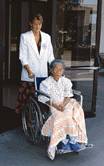
TUESDAY, March 2 (HealthDay News) — Elderly patients discharged from the hospital after a stay in the intensive care unit (ICU) have a high rate of death in the following three years, new research shows.
The risk of death is highest among patients who were on mechanical ventilation while in the ICU, according to the report published in the March 3 issue of the Journal of the American Medical Association.
U.S. researchers analyzed data on 35,308 Medicare patients (over age 65) who survived an ICU stay and were discharged from the hospital in 2003. After three years, the death rate for these patients was 39.5 percent, compared with 34.5 percent among elderly patients who’d been in hospital but not in the ICU (hospital controls), and 14.9 percent among elderly people in the general population.
Among the ICU survivors, the death rate was 57.6 percent for those who received mechanical ventilation and 38.3 percent for those who didn’t receive mechanical ventilation. The much higher death rate among those who’d been on mechanical ventilation was primarily due to a large number of deaths that occurred in the first six months after discharge, Dr. Hannah Wunsch, of Columbia University Medical Center and New York-Presbyterian Hospital/Columbia in New York City, and colleagues reported.
The study also found that the six-month death rate for the 33 percent of ICU survivors and 26.4 percent of hospital controls discharged to a skilled-care facility was 24.1 percent, compared with 7.5 percent for ICU survivors and hospital controls discharged home.
“The magnitude of the post-discharge use of skilled-care facilities for both ICU survivors and hospital controls and the high long-term mortality for all of these patients call into question whether discharge to skilled-care facilities is merely a marker for higher severity of illness with appropriate delivery of care. These patients could have been discharged prematurely from acute care hospitals, and needed a higher level of care than they received,” Wunsch and colleagues wrote.
“It also is possible that these patients could have had better outcomes if discharged home, but were not able to be sent there due to lack of sufficient support from family or friends to act as caregivers. These findings highlight the need for a much more detailed understanding of the long-term care needs of these patients,” the researchers concluded.
There has been little research into the outcomes of elderly ICU survivors, Wunsch and colleagues noted.
“Patients older than 65 years now make up more than half of all ICU admissions,” they wrote. “Information is needed to understand the patterns of mortality, morbidity and health-care resource use in the months and years that follow critical illness to allow for better targeting of follow-up care.”
More information
The Society of Critical Care Medicine has more about critical care.

